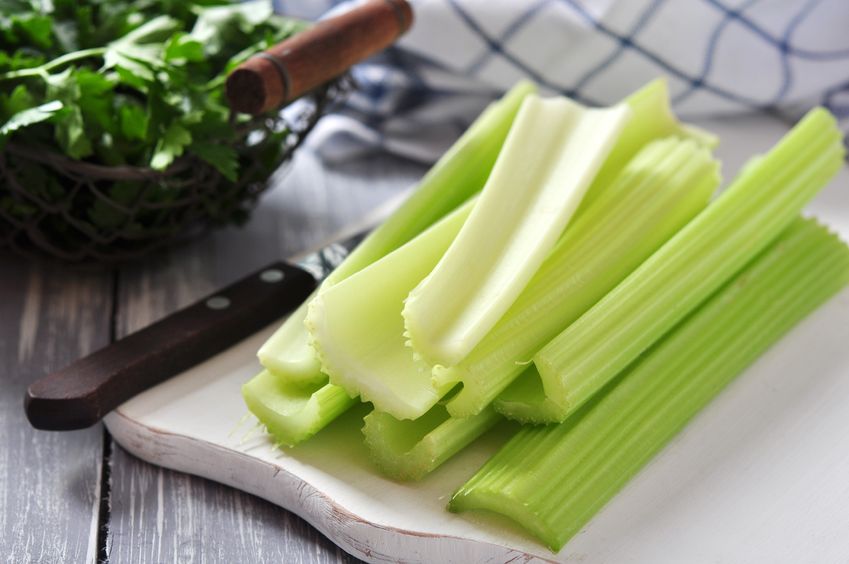Take celery. I was recently asked whether eating it caused you to lose weight. Sounds crazy, but the logic behind it is half plausible. It goes something like this: Celery has hardly any calories in it (6 calories per stalk) and the process of digesting food burns energy. Because celery is quite a bulky, fibrous plant it’s going to take a lot of chewing and digesting. Surely that’s more than those meager six calories? If true – eating celery will help you loose weight.
After a bit of digging into the scientific literature, I think I may be able to resolve the negative calorie food debate once and for all…
Negative Calorie Foods – Fact or Fiction?
Try googling ‘negative calorie diet’. You’ll be faced with a feast of websites that encourage eating celery, kale or kelp noodles to help lose weight. Search a bit longer and you will find dozens of articles, equal in number, arguing for and against the efficacy of a ‘negative calorie’ diet. Most of them offer a fairly reasoned, logical argument about why some foods can or cannot burn more energy than they yield. Few of them refer to any kind of scientific research (at least that I’ve found). And as we all know, a lack of research is insufficient to prove or disprove a theory.So first off, a bit of science:
Every time we eat, some of the energy (calories) contained in the food is lost – given off as heat. Put another way, at least 200kcal – the same as a small chocolate bar – is expended every day for the process of eating and digesting food. This energy ‘waste’ is called the thermogenic effect of food, dietary-induced thermogenesis or the ‘specific heat of feeding’. Or the thermic effect of food. Love scientists. Why use one term when four will do?
So the question we need to ask is: Does eating celery have a greater thermogenic effect than 6 calories per stalk?
If the answer is yes then the negative calorie foodies are right. If not, then raw celery advocates are making a lot of people flatulent for no good reason.
And the science says…
Oddly enough, no one has yet got round to measuring a person’s heat production after a celery meal. But fret not: a sizable amount of research has been done examining how the thermogenic effect of food changes depending on the type of food you eat.
You can measure the thermogenic effect of food by putting someone in a whole body calorimeter and asking them to eat. Measurements show that some foods are digested with little heat loss (fat-based foods have a small thermogenic effect), whereas high protein foods are the opposite and generate a lot of heat – presumably because the body has to work harder to digest it. The thermogenic effect of protein probably explains the ‘meat sweats’ sensation after a particularly heavy night’s meat binge. (click here to read my post on meat sweats)
Celery consists of mostly water and fiber. So what is the thermogenic effect of fiber and water? Almost nothing.
Remarkably, if you put someone in a whole body calorimeter and give them a high-fiber diet and their post-food thermogenesis (heat production) is actually reduced compared to a normal diet (references below). Supplementing a balanced 240kcal meal with 3 grams of fiber (equivalent of five celery stalks) reduces the overall thermogenic effect of the meal by 19kcal. This effectively means that of the 30 Calories gained from eating your celery stalks, 19 Calories fewer is used processing it than if it didn’t have the fiber in it.
So, the negative calorie diet fans are wrong: after being chewed, the fiber in celery gets passed through the gut and out the other end without the body doing too much to it on the way. Although that chewy celery stalk takes a while to munch – the gut doesn’t waste much time on it. No increased energy burn. No celery induced weight loss.
Of course, there are many reasons for adding fiber to your diet – they keep you feeling full and confer lots of health benefits. But burning up calories they do not.
I wonder how much heat burning a negative calorie diet book produces.
Source
http://realdoctorstu.com/2012/04/11/does-eating-celery-burn-calories-the-science-about-negative-calorie-diets-finally/
REFERENCES:
Mikkelsen PB, Toubro S, & Astrup A (2000). Effect of fat-reduced diets on 24-h energy expenditure: comparisons between animal protein, vegetable protein, and carbohydrate. The American journal of clinical nutrition, 72 (5), 1135-41 PMID: 11063440
Raben A, Christensen NJ, Madsen J, Holst JJ, & Astrup A (1994). Decreased postprandial thermogenesis and fat oxidation but increased fullness after a high-fiber meal compared with a low-fiber meal. The American journal of clinical nutrition, 59 (6), 1386-94 PMID: 8198065
Westerterp, K. (2004). Diet induced thermogenesis Nutrition & Metabolism, 1 (1) DOI: 10.1186/1743-7075-1-5




No comments:
Post a Comment